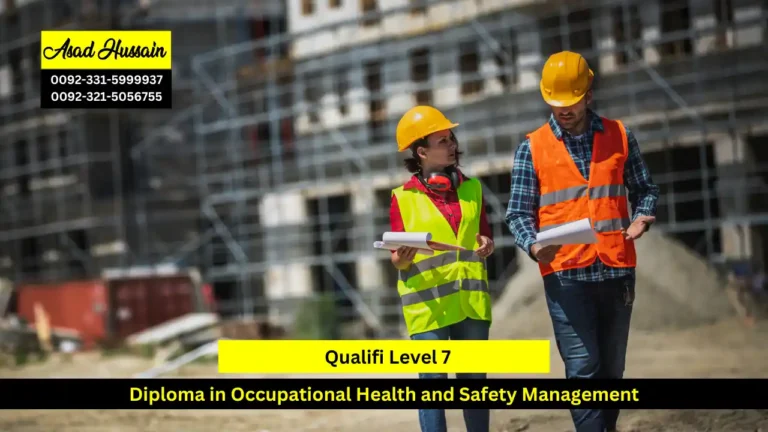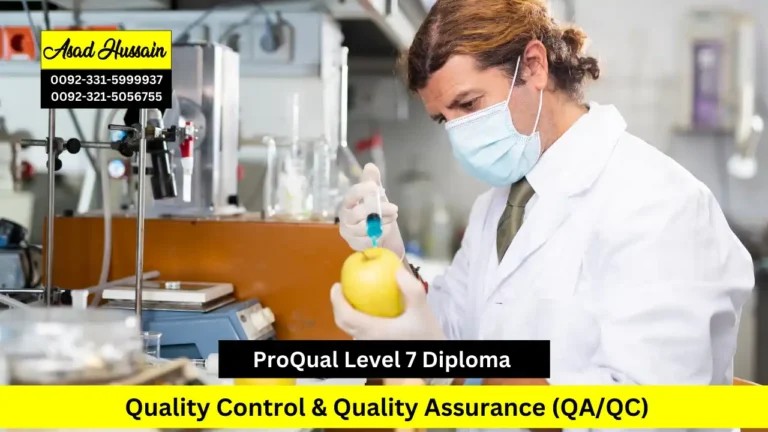In an increasingly complex and regulated world, the importance of safeguarding health, safety, and the environment cannot be overstated. The Level 7 c is a pivotal qualification designed to equip professionals with advanced knowledge and skills in these critical areas. Whether you’re looking to advance your career or meet the growing demand for expertise in health, safety, and environmental management, this diploma offers a comprehensive pathway to achieving your goals.
The Level 7 International Diploma is a postgraduate-level qualification aimed at professionals seeking to deepen their expertise in health, safety, and environmental (HSE) engineering. This diploma is designed for individuals who are already working in or aspiring to enter roles with significant responsibility in these fields. It provides an advanced understanding of the principles, practices, and regulations governing health, safety, and environmental management.
The Level 7 International Diploma in Health, Safety, and Environmental Engineering offers a robust and comprehensive education for professionals seeking to advance their careers and contribute to safer and more sustainable workplaces. By equipping you with advanced knowledge and practical skills, this diploma positions you as a leader in the field of health, safety, and environmental management.
If you’re ready to take the next step in your professional journey, the Level 7 International Diploma in Health, Safety, and Environmental Engineering could be the perfect opportunity for you. Embrace the challenge, expand your expertise, and make a significant impact in the field of HSE.
Program Highlights
Mandatory Units
- Foundations of Health, Safety, and Environmental Engineering
- Risk Assessment and Management
- Occupational Health and Safety Management
- Environmental Management Systems
- Emergency Preparedness and Response
- Sustainability and Corporate Social Responsibility
- Applied Health, Safety, and Environmental Engineering
- Candidates should hold a bachelor’s degree or equivalent qualification in a relevant field such as engineering, environmental science, occupational health and safety, or a related discipline from a recognized institution. A minimum GPA or equivalent academic performance may be required, typically at least a 2:1 or equivalent.
- While not mandatory, applicants with relevant professional experience in areas such as engineering, health and safety management, environmental management, or ICT-related industries are preferred. Professional experience provides valuable context and practical insights that enhance the learning experience.
- Proficiency in the English language is essential for successful participation in the program. Candidates may be required to provide evidence of English language proficiency.
Foundations of Health, Safety, and Environmental Engineering
- Understand the fundamental principles of health, safety, and environmental engineering.
- Analyze the historical development and evolution of HSE standards and practices.
- Identify key stakeholders and their roles in HSE management.
- Explain the legal and regulatory frameworks governing HSE in various jurisdictions.
- Apply foundational HSE concepts to real-world scenarios and case studies.
Risk Assessment and Management
- Conduct comprehensive risk assessments using established methodologies.
- Identify potential hazards and evaluate their impact on health, safety, and the environment.
- Develop risk management plans and strategies to mitigate identified risks.
- Communicate risk assessment findings effectively to stakeholders.
- Implement monitoring and review processes to ensure ongoing risk management effectiveness.
Occupational Health and Safety Management
- Understand the principles and practices of occupational health and safety management.
- Develop and implement effective occupational health and safety programs.
- Evaluate workplace hazards and implement control measures to reduce risks.
- Conduct safety audits and inspections to ensure compliance with safety standards.
- Promote a culture of safety within organizations through training and awareness programs.
Environmental Management Systems
- Understand the components and requirements of environmental management systems (EMS).
- Develop and implement an EMS in compliance with international standards such as ISO 14001.
- Conduct environmental impact assessments and audits.
- Identify and manage environmental aspects and impacts within an organization.
- Develop strategies for continuous improvement in environmental performance.
Emergency Preparedness and Response
- Develop comprehensive emergency preparedness and response plans.
- Identify potential emergency scenarios and evaluate their impact on health, safety, and the environment.
- Coordinate emergency response efforts and allocate resources effectively.
- Conduct training and drills to ensure readiness for emergency situations.
- Evaluate and improve emergency response plans based on post-incident analysis.
Sustainability and Corporate Social Responsibility
- Understand the concepts of sustainability and corporate social responsibility (CSR).
- Develop and implement sustainability initiatives within organizations.
- Evaluate the social, environmental, and economic impacts of business activities.
- Promote sustainable practices and CSR initiatives to stakeholders.
- Measure and report on sustainability and CSR performance using established frameworks.
Applied Health, Safety, and Environmental Engineering
- Apply advanced HSE engineering principles to solve complex problems.
- Design and implement HSE solutions tailored to specific industry needs.
- Integrate HSE considerations into engineering projects and processes.
- Conduct applied research in HSE engineering and present findings effectively.
- Collaborate with multidisciplinary teams to achieve HSE objectives.
The Level 7 International Diploma in Health, Safety, and Environmental Engineering is designed for professionals aiming to advance their careers and expertise in the fields of health, safety, and environmental management. This course is ideal for HSE managers, safety engineers, environmental consultants, and compliance officers who seek to deepen their knowledge and skills to handle complex HSE challenges. It is also suitable for project managers and senior executives responsible for integrating HSE practices into organizational strategies and operations. Whether you are an experienced professional looking to elevate your career or a newcomer aspiring to enter the HSE field, this diploma provides the advanced education and practical application necessary to excel in various industries and global contexts.







